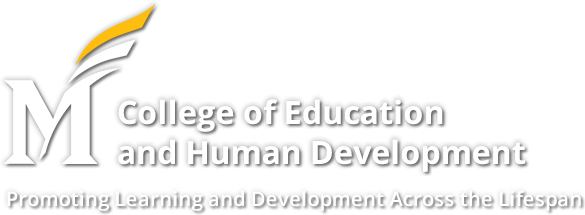College of Education and Human Development
Ready to Teach: New Teachers Cap Off Their Studies Before Heading to Classrooms
June 26, 2013
After two years of studying full-time at Mason, a group of elementary teachers-to-be capped off their learning with research first… celebrations second!
The future teachers were enrolled in the Elementary Education master’s degree program offered by the College of Education and Human Development at George Mason University. The program provides each student with the coursework needed to receive a Virginia license to teach PreK-6th grade, as well as a research-based background in education theory and practice.

Mason graduate students share their experiences as student teachers.
Research in action
The novice teachers gathered on the Fairfax campus in June for a research colloquium where they reported on the in-class, on-the-ground research they had conducted as part of their school internships in spring 2013.
Called “action research,” the teachers were tasked with identifying areas for improving students’ learning as well as their own instructional practice. The teachers then engaged in systematic data collection and analysis, and created and implemented interventions based on the latest research in education effectiveness.

Future elementary teachers cap off their studies with a research colloquium.
“During the internship, I wondered how we would be able to do all the things we needed to do in order to teach and still have time for action research,” said Dawn. “My experience taught me that action research is a natural part of teaching. Now I can’t imagine teaching without engaging in action research.”
Assistant Professor Stephanie Dodman noted how the action research pushed the students to see themselves as agents of change for their students. “Quick fixes were replaced in favor of thoughtful research oriented action. It was astounding to see them develop into such a role.”
Among the research topics the teachers explored were the following:
- How differentiated instruction and assessment can improve learning for English Language Learners
- How mentor texts can impact student writing
- How relationship building can improve classroom management
- How repeated interactive read alouds can improve comprehension
- How brain breaks impact student engagement
- How repeated readings of poetry can improve fluency
- How yoga and relaxation techniques can help students focus in the classroom
- How service learning can engage students in high poverty urban schools
- How various strategies can improve participation during class discussions
- How reading logs and book talks can encourage independent reading
“I am very pleased with the results that came from the strategy I implemented,” said Nicole. “It was really neat to see how the students responded and the positive impact that I had made both as a researcher and teacher.”

The students' action research focused on improving their pupils' learning and their own instructional practice.
Also in attendance at the colloquium were many pre-service teachers just completing their first year of study in the Elementary Education program. These graduate students will engage in their own internships and research in spring 2014.
“This process changed the way I look at instruction,” said Kelly. “I see how easily a teacher can change learning by looking carefully at the students’ responses to instruction methods.”
Ready to teach
The Elementary Education program at Mason is unique not only in its emphasis on action research but also in its structure as a “professional development school network.” The program works in close partnership with 18 elementary schools in Fairfax, Arlington, Prince William, and Loudoun counties. The placement of student teachers is just one facet of an intensive university/school collaboration that involves parents, teachers, students, administrators, and faculty in improving teaching and learning.
“It was so exciting to hear these novice teachers,” said >Assistant Professor Katy Swalwell. “They are absolutely ready to tackle the challenges of teaching by making research-based decisions about their classroom practice.”
Shannon King, an adjunct faculty member and current teacher in Fairfax County Public Schools, concurred: “As an instructor, one powerful part of the process was watching the students really embrace the mindset of reflective practitioners. The students also had the opportunity to collaborate with each other in this work, and that spirit of collaborative inquiry will serve them well in their future work as members of professional learning communities.”
* * *
The application deadlines for the Elementary Education program are October 1 and February 1. Please see the program’s website for more information.
Many thanks to the program’s students along with Drs. Stephanie Dodman, Lois Groth, Shannon King, Seth Parsons, Debbie Sprague, and Katy Swalwell who participated in the design and implementation of this capstone course experience.
About CEHD
George Mason University's College of Education and Human Development (CEHD) includes two schools, the Graduate School of Education, one of the largest in Virginia, and the School of Recreation, Health, and Tourism. CEHD offers a comprehensive range of degrees, courses, licensures, and professional development programs on campus, online, and on site. The college is distinguished by faculty who encourage new ways of thinking and pioneering research supported by more than $75 million in funding over the past five years.
For additional information:
- CEHD Communications: cehdnews@gmu.edu
- Graduate School of Education: gse.gmu.edu
- Elementary Education program: gse.gmu.edu/programs/elementaryed
Follow CEHD on Facebook at www.facebook.com/MasonCEHD or Twitter at @MasonCEHD. Or subscribe to CEHD Connections, the college's occasional e-newsletter.
